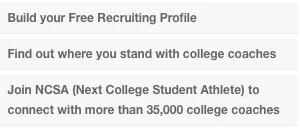Draft and Amateurism Debates Are Basically Separate
Sean Deveney of Sporting News:
The sources said that, in order to pave the way for raising the age limit, the league would be willing to expand salaries in the D-League, giving each team a salary cap and allowing executives with each team to sign players as they wish. Not only would that allow D-League teams to sign good young players, it would allow NBA clubs to size up young executives and player evaluators.
This has led some commentators, including some consistent critics of the NCAA, to find a very neat solution to a number of problems:
If there is a legit minor league option and players have a real choice, then NCAA can do what it wants. Football not so easy, though.
— Andy Staples (@Andy_Staples) April 18, 2014
Except the draft age limit and amateurism debates have almost nothing to do with each other.
Imagine if the NBA (and NFL for that matter) had a bona fide competitor to college basketball. Not the existing D-League or even the enhanced D-League currently being considered but virtually the same thing the NCAA provides: a developmental league for 18–23 year olds. Imagine all 30 NBA teams had a team in this league, potentially offering professional opportunities to around 400 of the best young basketball players in the country.
If the NCAA and its members are still making revenue similar to what they are today, there is still the question of whether they should be able to agree to cap compensation at the value of a scholarship. Regardless of revenue, there are still issues of athletes not having the same opportunities for outside income as other students. Going beyond amateurism, draft rules do not address the full grant-in-aid/cost of attendance gap, the nutritional needs of athletes, graduation rates, scholarship cancellation or medical costs.
Now imagine that the NBA gets its wish with a 20 or 21 year-old age limit for draft eligibility and the NCAA has become fully professionalized, with players receiving salaries, hiring agents, signing endorsement deals, and not attending class. This is still unfair to at least a handful of players who will not make nearly enough in even this form of “college” basketball to make up for the millions they will potentially lose by delaying their free agency. If college basketball still has elements of the existing NCAA system like academic eligibility requirements and limits on practice time, the issues of pushing or luring athletes to college remain along with questions about whether colleges should run the NBA’s minor league and whether it is the proper development environment for players.
There’s two ways to look at college athletics: as private enterprise or a government program. Either way, changes to professional draft rules do very little to help the NCAA justify its position. As private enterprise, it still needs to establish why antitrust law should not apply, especially to an activity easily categorized as price fixing, not to mention the moral arguments raised both for and against amateurism. As a government program, college athletics should continue held to the even higher standard of fulfilling an important function and doing so in a fair way to the maximum number of people. The NBA offering a different route to even hundreds of players does little to help the NCAA in either case.


